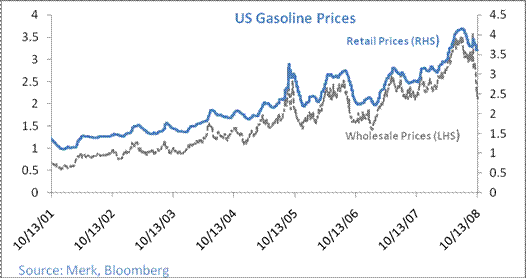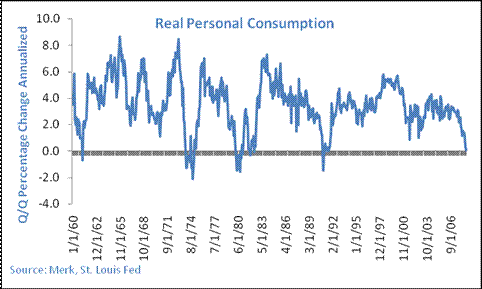Reduced Gasoline Prices Provide Economic Relief, But May Not Change Consumer Outlook
Economics / US Economy Oct 17, 2008 - 07:14 AM GMTBy: Joseph_Brusuelas

 Gasoline prices have seen a steep decline over the past three months. Since hitting a peak on July 20, the national average price for a gallon of gasoline has declined 52 cents, which should inject approximately $120 to $130 billion into the pocketbooks of consumers, with more expected on the way.
Gasoline prices have seen a steep decline over the past three months. Since hitting a peak on July 20, the national average price for a gallon of gasoline has declined 52 cents, which should inject approximately $120 to $130 billion into the pocketbooks of consumers, with more expected on the way.
Although, the decline in the cost of energy and other commodities will somewhat offset the overall fall in the rate of personal consumption, the US consumer is well on its way to pulling back the reins on spending in a manner that has not been seen since the early 1980's.
Real personal consumption looks to be on a pace to decline -3.0% in Q3'08 and will almost certainly see a second consecutive negative quarter during the final three months of the year. If consumption were to decline at a similar rate during the final quarter of the year it will be the first time since 1951 that changes of that magnitude have been observed in real personal consumption.

The combined impact of falling housing prices, the reduced value of equity portfolios and bleak job and income prospects are in the process of reshaping consumer expectations despite the positive impact from reduced gasoline prices on the bottom line of consumers. Recent data on retail sales provide tangible evidence that the consumer is in the process of a once in a generation retrenchment.
The primary question outstanding is not if consumers will cut back spending, but where and how. We anticipate that the majority of the reduction in consumption will occur in the ex food and energy category, with particular emphasis on imported goods. On a monthly basis, demand for imported goods declined from $194.94bln in July to $188.54bln in August. Inside the goods category that declined -3.3% in August, demand for computer accessories, household electronics and appliances all experienced declines.

Going forward we expect the consumer to begin increasing her rate of savings over the next year as individuals adjust to a diminished employment and income picture. Reduced demand for goods overall and imported goods in particular, will hit the retailers quite hard and curtail overall growth. The approximately $300bln output gap that the majority in Congress appear to be targeting with their new proposal will not provide direct rebate checks to consumers, but looks to be aimed at bailing out states and municipalities and focused on job creation vis-à-vis infrastructure projects.
Thus, the largest decline in retail prices that have been recorded in the post war era looks to have little impact over the remainder of the year and well into 2009 on the behavior of the consumer.
By Joseph Brusuelas
Chief Economist, VP Global Strategy of the Merk Hard Currency Fund
Bridging academic rigor and communications, Joe Brusuelas provides the Merk team with significant experience in advanced research and analysis of macro-economic factors, as well as in identifying how economic trends impact investors. As Chief Economist and Global Strategist, he is responsible for heading Merk research and analysis and communicating the Merk Perspective to the markets.
Mr. Brusuelas holds an M.A and a B.A. in Political Science from San Diego State and is a PhD candidate at the University of Southern California, Los Angeles.
Before joining Merk, Mr. Brusuelas was the chief US Economist at IDEAglobal in New York. Before that he spent 8 years in academia as a researcher and lecturer covering themes spanning macro- and microeconomics, money, banking and financial markets. In addition, he has worked at Citibank/Salomon Smith Barney, First Fidelity Bank and Great Western Investment Management.
© 2008 Merk Investments® LLC
The Merk Hard Currency Fund is managed by Merk Investments, an investment advisory firm that invests with discipline and long-term focus while adapting to changing environments. Axel Merk, president of Merk Investments, makes all investment decisions for the Merk Hard Currency Fund. Mr. Merk founded Merk Investments AG in Switzerland in 1994; in 2001, he relocated the business to the US where all investment advisory activities are conducted by Merk Investments LLC, a SEC-registered investment adviser.
Merk Investments has since pursued a macro-economic approach to investing, with substantial gold and hard currency exposure.
Merk Investments is making the Merk Hard Currency Fund available to retail investors to allow them to diversify their portfolios and, through the fund, invest in a basket of hard currencies.
Joseph Brusuelas Archive |
© 2005-2022 http://www.MarketOracle.co.uk - The Market Oracle is a FREE Daily Financial Markets Analysis & Forecasting online publication.


